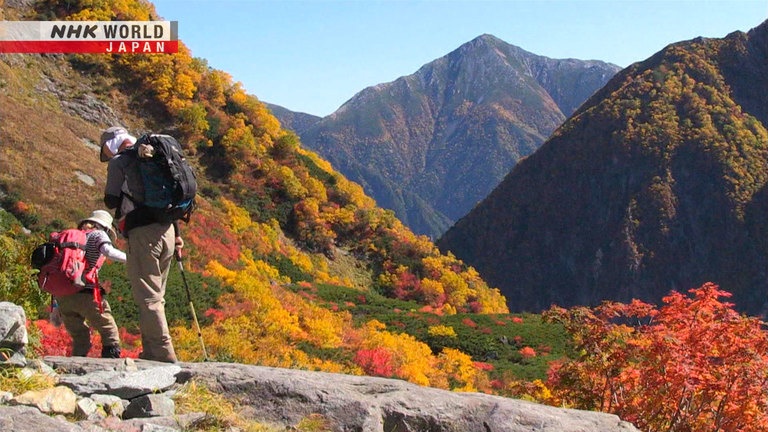Mountain
This episode focuses on words related to yama (mountains). Mountains make up about 75% of Japan's territory, and they have made their way into many common expressions in the Japanese language.




Transcript
"Yukigesho."
"Karakurenai."
The Japanese language is rich in unique expressions that reflect nature and culture.
Magical Japanese.
Today's theme is "yama," or mountain.
Japan is a volcanic archipelago, with mountains making up about 75 percent of its territory.
Mountains have made their way into many common expressions in the Japanese language.
Gorgeous, isn't it?
Oh, hello! I'm Peter MacMillan.
What you see here before you is one of my favorite mountains, Mt. Ogura, or "Ogurayama" in Japanese.
In Japanese, mountains often have names that end with - "yama."
Arashiyama is one good example.
Let's look at how mountains feature in Japanese expressions, starting with...
"yamanobori."
"Nobori" means "climbing."
"Yamanobori," or mountain climbing, is a popular form of recreation in Japan,
partly because of its health benefits.
Many people head to the mountains on weekends and holidays.
"yamanobori."
What a wonderful feeling to spend this beautiful day on this majestic mountain.
Speaking of mountain-related expressions,
Japanese people love to use mountains as metaphors for anything piled up high.
"yamazumi."
"Zumi" means "stacked" or "piled."
"Yamazumi" refers to a pile that is balanced in the form of a mountain, with a wide base and narrow top.
It's used for things that have been neglected or that haven't been tidied up, such as a pile of papers or laundry.
It is also used figuratively for tasks and errands that have piled up.
"yamazumi."
I also have a "mountain" of writing to do, but being out in nature like this refreshes my spirit.
Not only is Japan a very mountainous country in general,
it is also home to many small, low mountains such as Mt. Ogura.
As a source of food, water, and other resources,
mountains have long played an important role in everyday life in Japan.
For this reason, Japanese people have approached mountains with affection, awe, and reverence.
In Japan, there are also high and steep mountains, which go by a different name.
"take."
"Take" is commonly used for high mountains that are challenging to climb.
Some famous examples are Yatsugatake and Kaikomagatake.
In Japanese, the length of trousers, skirts, and other clothes is also generally referred to as "take,"
a word that represents vertical height, just like the "take" of high mountains.
"take."
By the way, the Japanese islands are also home to many mountainous volcanoes,
which have been a treasure trove of mineral resources such as gold and silver.
That may be why we have the following mountain-related idiom.
"hitoyama ateru."
"Hito" is "one," and "ateru" means "to find" or "to hit upon."
The phrase means to become rich by betting on a one-in-a-million chance.
In this instance, "yama" refers to a mine.
From the 13th to 17th centuries, Japan was known globally for its mineral reserves.
Minerals were an important export item.
I heard he started a new business.
Yes, though it does seem a bit dodgy.
I doubt he'll "hitoyama ateru" - hit the jackpot - with it.
"hitoyama ateru."
When people in the past traveled long distances, up and over mountains, they either went on foot or on horseback.
But sailing was out of the question!
After all, boats don't climb mountains...
Or do they?
"sendo oku shite fune yama ni noboru."
"Sendo" is the captain of a ship.
"Oku shite" means "with too much of" or "to make a lot of."
"Fune" is a ship.
The phrase literally means, "having too many captains makes the ship run up onto a mountain - in other words, go off course.
It describes how confusion occurs when several people try to lead a team or project,
resulting in something that is off the mark.
In English you might say, "too many cooks spoil the broth."
Some say our new product should be for teens, while others say we should target seniors.
I'm worried it's going to be a case of "sendo oku shite fune yama ni noboru" - too many cooks spoil the broth.
"sendo oku shite fune yama ni noboru."
We are just close to the summit.
What a splendid view!
I feel like I'm the king of the hill!
Which reminds me of the following expression...
"oyama no taisho."
"Taisho" literally means a military general, but the word is commonly used for someone who stands above the rest.
"Oyama no taisho" is someone who overestimates themselves based on their limited circle of influence and is arrogant.
The phrase is associated with the image of a bossy child standing on a mound in the playground and giving orders to other children.
That actor is so arrogant on set recently.
I guess his recent series of roles have made him "oyama no taisho" - overly self-important.
"oyama no taisho."
Mt. Ogura is actually most famous for...
the "Hyakunin Isshu" poetry anthology!
A famous poet kept a villa at the foot of this mountain in the early 13th century.
He put together a poetry collection by selecting one outstanding waka poem from each of one hundred poets.
This became the Hyakunin Isshu, or One Hundred Poets, One Poem Each.
And of course, there is a poem that talks about Mt. Ogura.
"Ogurayama mine no momiziba kokoroaraba
ima hitotabi no miyuki matanamu."
Dear Maples of Mount Ogura,
if you have a heart,
please wait for another visit
so that His Majesty may enjoy
your lovely autumn colors.
I've finally reached the peak!
So, what did you think of today's program?
Even if your Japanese improves after watching this,
be careful not to declare yourself king of the hill, or "oyama no taisho."
See you next time. Bye.